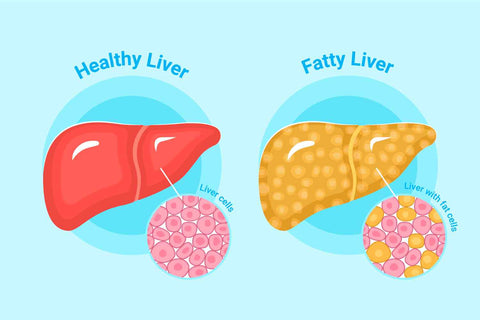
Fatty liver, also known as hepatic steatosis, is a common condition characterized by the excessive accumulation of fat within liver cells. This fat buildup can interfere with the liver’s normal functioning. While it's normal for the liver to contain a small amount of fat, if fat accounts for more than 10 percent of the liver’s weight, it indicates the presence of fatty liver, which may lead to more serious complications.
There are two primary types of fatty liver:
- Alcoholic fatty liver disease- Regular alcohol consumption becomes a major cause of fatty liver disease. It is characterized by the accumulation of fat in liver cells due to the toxic effects of alcohol.
- Non-Alcoholic Fatty Liver Disease- It is a more common form of fatty liver that often occurs in individuals who have risk factors such as obesity, insulin resistance, high cholesterol, or a sedentary lifestyle.
Symptoms of fatty liver disease-
Fatty liver disease often presents no noticeable symptoms in its early stages. If symptoms do occur, they may include:
- Abdominal discomfort
- Fatigue or mental confusing
- Yellowish skin and whites of the eyes
- Swollen abdomen and legs
How to diagnose fatty liver disease-
While there is no specific medication for treating fatty liver, lifestyle changes can effectively manage and sometimes reverse the condition. Here are some strategies to help reduce fatty liver:
- Dietary Changes:
- Choose Healthy Fats: Opt for foods rich in healthy fats, like avocados, nuts, seeds, and fatty fish.
- Increase fiber Intake : Consume plenty of fruits, vegetables, whole grains, and legumes to boost fiber intake.
- Reduce Saturated and Trans Fats: Limit foods high in saturated and trans fats, such as fried foods and processed snacks.
Lose weight- Weight loss and fatty liver are connected with each other. Exercise, paired with diet, can help you lose weight and manage your liver disease. Aim to get at least 30 minutes of aerobic exercise on most days of the week.
3. Alcohol Moderation:
Alcohol can be a major cause of fatty liver disease as well as other liver diseases. Try to consume it in moderation or consider eliminating it altogether.
4. Control Diabetes and Manage Cholesterol:
Diabetes and fatty liver disease often occur together. Diet and exercise can help you manage both conditions.
5. Hydration:
Water is needed for the liver to function properly. Stay hydrated by drinking plenty of water, as proper hydration supports liver function. Aim to drink 8-10 glasses of water per day.
It's crucial to address fatty liver early to prevent further liver damage. Regular follow-up with a healthcare professional and lifestyle changes such as stress management or physical activity are essential for controlling fatty liver.





